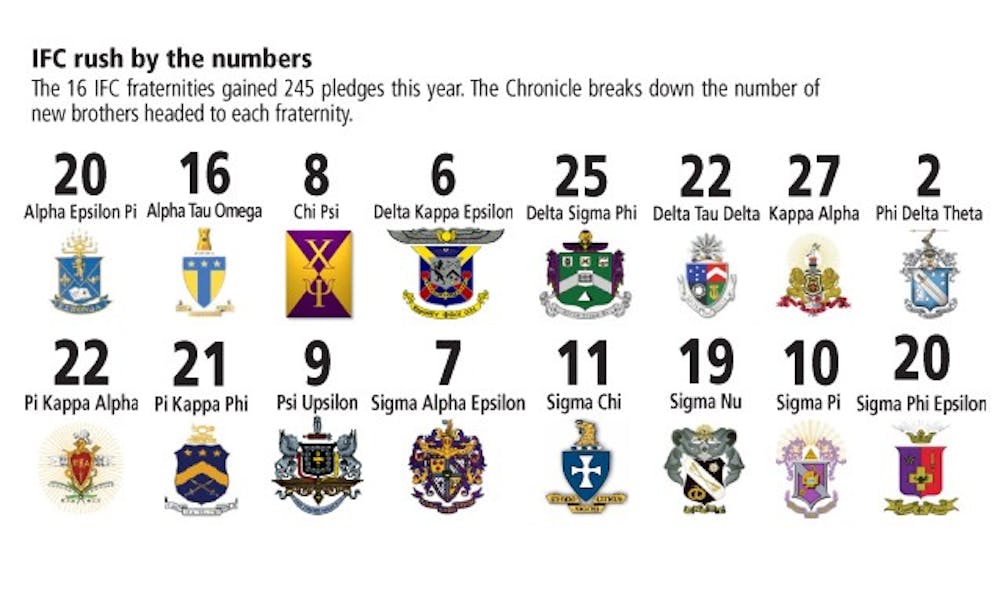New fraternity members celebrate as the two-week recruitment process came to an end Monday.
The Interfraternity Council recruitment process officially ended Monday night as 16 Duke fraternities extended 382 bids to 247 rushees, said senior Matt Forester, IFC vice president of recruitment and new member education. Of the bids offered, 201 students accepted a bid and 46 declined for various reasons, some opting to join a selective living group instead. The number of bids given this year is comparable to last year, when IFC extended 372 bids to 291 rushees—244 of whom accepted.
This year, 501 students originally registered for recruitment, though some dropped out of recruitment or did not get invited back to subsequent recruitment rounds. By the end of the process, more than 125 students did not receive bids, Forester said.
“In the end, less kids received bids, but the same number of bids were given out,” Forester said. “There were more kids with multiple bids because of the shorter process, but I can’t tell you if that’s a good thing or a bad thing.”
Forester said Kappa Alpha Order received the highest number of accepted bids at 27—a sharp increase from the 12 bids extended last year. Phi Delta Theta had the smallest pledge class, with two members.
Several changes were instituted in the IFC recruitment process this year, including the addition of IFC representatives—or recruitment assistants—who visited every recruitment event to ensure that the events were safe and legitimate. The rushing process was also shortened from three weeks to two weeks and began earlier.
“For me, recruitment was partly what I expected,” freshman Harrison Richard said, who accepted a bid to Alpha Tau Omega. “I didn’t expect that it would be as much of a party as it turned out to be, but that doesn’t take away from the fact that I definitely got to know the brothers in the chapter that I chose to affiliate with.”
Clarybel Peguero, assistant dean of fraternity and sorority life, said that she was pleased by the hard work of the recruitment team and IFC President Zach Prager, a senior. She added that those in IFC have taken many of the negative events to heart concerning greek life at other universities, such as Princeton University, Yale University and Cornell University.
“We were very transparent about the process, and the men held each other more accountable throughout the process than in past years,” Peguero said. “[IFC] understands that at any time the greek community can be disrupted, so they are taking things much more seriously and understanding the impact that recruitment can have on the young men of this community.”
Richard noted that he is pleased with the his bid, yet acknowledged that there are flaws in the system.
“I have a friend who wasn’t extended a bid, though I think he would have been deserving…. The fraternity brothers that I’ve talked to are cognizant of the fact that the system doesn’t always work, but they do the best they can, and they try to introduce the human element into the process,” Richard said.
Freshman Ben Freeberg, who accepted a bid with Pi Kappa Phi, said that the rush process felt too short.
“If it was longer and spread out more, the brothers would have gotten a better chance to get to know people,” he said. “It’s hard to do that with one night a week at a [fraternity]. It was tiring, but it was definitely one of the most fun two weeks I’ve had here.”
Get The Chronicle straight to your inbox
Sign up for our weekly newsletter. Cancel at any time.

